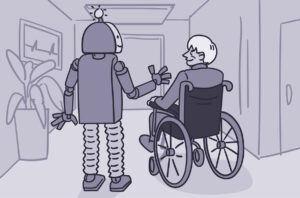Complications
- Target organ diseases occur most frequently in
- Heart
- Hypertensive heart disease
- Coronary Artery disease
- Hypertension disrupts the coronary artery endothelium
- This results in a stiff arterial wall with a narrowed lumen, and accounts for a high rate of CAD, angina, and MI.
- Left ventricular hypertrophy
- Increased contractility increases myocardial work and O2 demand
- Heart failure
- Occurs when the heart’s compensatory mechanisms are overwhelmed and the heart can no longer pump enough blood to meet the body’s demands
- Coronary Artery disease
- Hypertensive heart disease
- Brain
-
-
- Cerebrovascular disease
- When BP exceeds the body’s ability to autoregulate, the cerebral vessels suddenly dilate, capillary permeability increases, and cerebral edema develops.
- This produces a rise in intracranial pressure. If left untreated, patients can die quickly from brain damage
- Cerebrovascular disease
- Peripheral vascular disease
- Hypertension speeds up the process of atherosclerosis in the peripheral blood vessels.
- This leads to the development of peripheral vascular disease, aortic aneurysm, and aortic dissection
- Kidney
- Nephrosclerosis
- Results from ischemia caused by the narrowing of the renal blood vessels.
- This leads to atrophy of the tubules, destruction of the glomeruli, and eventual death of nephrons.
- Initially intact nephrons can compensate, but these changes may eventually lead to renal failure
- Laboratory indications of renal disease are albuminuria, proteinuria, microscopic hematuria, and elevated serum creatinine and blood urea nitrogen (BUN) levels.
- Nephrosclerosis
- Eyes
- Retinal damage
- Damage to the retinal vessels provides an indication of related vessel damage in the heart, brain, and kidneys.
- Manifestations of severe retinal damage include blurring of vision, retinal hemorrhage, and loss of vision.
- Retinal damage
-
- Heart




